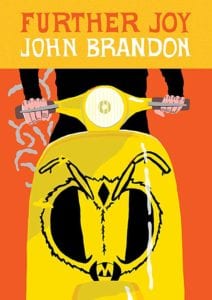
Quirky, inventive characters populate John Brandon’s first short story collection, from a down-on-his-luck former high school football star to a little league player obsessed with entrepreneurship. Each of the 11 stories is a winner.
Shelf Unbound: You’ve written three novels, and this is your first collection of short stories. What does the short story afford you as a writer that a novel does not?
John Brandon: Stories are harder in so many ways. In a story, you have to get somewhere that feels meaningful, or at least pointedly and thoroughly imagined, in such a short distance. You have to do a magic trick, sort of, one that hasn’t been done before, you hope. Every word counts. You have to think like a poet—every image is either helping the cause or it has to go. There’s more pressure than when you sit down to work on your novel. In a novel, there’s no rush. It’s enough to keep figuring out what happens next. Magic isn’t really required—just a lot of work. What the short form does afford you is a space to do things that would be tedious over hundreds of pages. Certain types of comedy. Dizzying sweet little trips like, say, Barthelme did. Or in the case of my collection, I felt more comfortable using odd points of view. I’ve got third and first person plural in there.
Shelf Unbound: What’s your process for finding and then developing your characters, like Little Leaguer Marky Sessions, obsessed with getting his entrepreneurial ideas into play?
Brandon: No method. Catch as catch can. Marky was a very minor character in a failed novel I wrote in grad school. A couple years after I’d put the thing in a drawer and left it behind, I found myself thinking about Marky. I write a lot of dark characters and dark situations, so it was refreshing to write a kid like Marky, to imagine noble motivations for him. Toby, the main character in my novel Citrus County, is the opposite of Marky—he’s a prodigy at evil. I don’t think I could’ve written a novel about Marky, because he’s too good, but I thought it might be interesting to follow him around for a day. Maybe that’s another thing the short story affords you—the chance to be upbeat.
Shelf Unbound: Your characters are mostly struggling through life on their own, one or two steps away from something really bad happening. Is that a theme you developed consciously, or is that just where these stories ended up going?
Brandon: That’s just where they ended up. They were written over a span of fifteen years, and I didn’t have a collection in mind while I was writing any of them. I tend to write about people with money problems. People with talents they can’t profit from. It’s not a conscious choice, but I think all writers have territory they’re comfortable on, and they gravitate toward it.
Shelf Unbound: I particularly love your approach to the title story, referring to the characters as either “the girls” or “the fathers” in a seemingly detached manner: “One of the fathers followed a Mexican soap opera. The women were huge-eyed and single-minded, and the story would never end. It would outlive the father and maybe even his daughter.” But layer upon layer these snippets build on each other and develop into an emotionally deep story. How did your approach to “Further Joy” come about?
Brandon: That story started as notes for something longer—maybe a novella, I was thinking. It was going to be about this gaggle of high school girls, and I sat and wrote down anything I could about their lives. Then I got distracted from the project for a while, as will happen.
When I pulled the notes back out a year later or something, my wife happened to be pregnant with our first child. She didn’t want to find out whether it was a boy or a girl, and I was secretly terrified at having a girl. So with that in my blood, the notes took on an edge, and I liked the way it sounded if I read straight through all these snippets.
Next thing I knew, I had the first half of the story. Then the fathers followed naturally from that.
